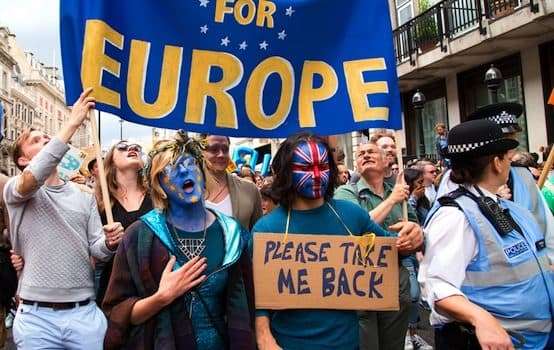
Two news items from Europe, just a few days apart, send divergent messages about the fate of the European Union. And these two divergences could combine into a new and chaotic kind of convergence within the EU.
The first item is the tumultuous situation surrounding the new government in Italy, one elected on a strongly anti-EU platform. The second is the inauguration of the EU’s General Data Protection Regulation (GDPR). Let’s look at each in turn.
The likely new Italian government is the fruit of elections in which two anti-EU parties won a combined 70 percent of the vote. The winning coalition has pledged to crack down on immigration—which has created teeming refugee camps on a scale not seen since the aftermath of World War Two—and also to reconsider Italy’s participation in the Euro currency, which Italians denounce as a “German cage.”
As of this writing, the identity of the prime minister is unclear. And yet the real powers in Rome stand behind the throne. One of those powers is Matteo Salvini; just on May 24, Salvini made headlines by denouncing those “who want Italy to be a French or German colony.” Further sniping at the EU hierarchs who want Italy to raise revenues to balance its budget, Salvini declared, “The last thing that Italy needs is taxes.” Addressing his fellow Italians, he added, “I think you voted for us to do the exact opposite of what Europe has suggested or imposed with their threats.”
- Italy Sets Course for Left-Right Populist Surge
- Emmanuel Macron, the New King of Europe?
Yes, the new Italian leadership is profoundly “Euroskeptic.” And yet here’s the thing: For all their skepticism, these Italian leaders aren’t talking about actually leaving the EU.
Why? For one thing, the financial benefits of EU membership are substantial, starting with the EU’s purse, which in 2019 will total nearly $200 billion. That money, which comes mostly from the countries of the north, notably Germany, is heavily oriented toward subsidizing—some might say, bribing—the countries of the south and east.
Yet by any name, it’s working. Thus Italy is charting a different course from that of another skeptical EU country, the United Kingdom, which, as we all remember, voted in 2016 to exit the union.
And yet interestingly, almost two years later, the British are in a pother over actually realizing said Brexit. The problem, you see, is that the Brits want to have their cake and leave it, too. That is, they want the trading and financial benefits of the Eurozone, but not the actual burden of EU membership. In the meantime, of course, the wily Eurocrats, protective of their Brussels-based semi-empire, are throwing up every possible obstacle to Brexit.
So what will happen? Will Brexit actually occur? Well, that’s unclear. It’s worth recalling that the “Bremain” side garnered more than 48 percent of the vote two years ago. Since then, public opinion has become even more narrowly divided. According to polling data aggregated by WhatUKThinks, British voters today say that they regret the Brexit vote by a single percentage point, 44-43, even as, curiously, they still support Brexit, albeit also by a single point, 45-44. And as to the specific question of whether the UK should remain a member of the EU, the polling, Brexit vs. Bremain, is even-steven, 47-47.
With knife-edge numbers such as those, it’s no surprise that London is moving slowly—or, if one prefers, going wobbly. Indeed, it’s possible that another round of national balloting will be needed before there’s a resolution on moving forward with Brexit, or not.
With the UK’s difficulties in mind, the Italian position, defined as rejecting the EU while accepting the EU, begins to make sense. Whereas the English, in their Anglo-Saxon literal-mindedness, seem to believe that a law must be obeyed—or else must be noisily rejected outright—the Italians have a different approach, in keeping with their experience of surviving umpty-ump tyrants. That is, in their sinuous struggling, they echo a familiar phrase in Mediterranean lands: “I obey but I do not comply.”
Indeed, the same sort of nationalistic passive-aggressive stance is visible, too, in many other countries within the EU. These nations don’t love the union, but they don’t want to leave it, because the money is too good. And yet even as they remain, they resist; every last issue of sovereignty—most notably, immigration—is becoming a protracted fight. And more often than not these days, the stubborn parochialists within the EU are thwarting the Brusselcrats’ yearned-for general-will universalism. In fact, the EU’s consensus-oriented political mechanism is acutely vulnerable to a modern-day liberum veto—that is, the free veto, to be wielded by a single country or bloc. (Earlier this year, here at TAC, this author detailed the status of Poland, one of those free-vetoers willingly held captive by capital.)
So if we put on our Hegelian dialectic hat, we can see that while the centrifugal forces of “Exit” are powerful, so, too, are the centripetal forces of “Remain.” So maybe the result will be a synthesis, which we can dub “Remexit.”
Remexit is not at all a formula for the “widening and deepening European integration” that EU champions have dreamt of and still dream of. Instead, an EU full of reluctant-but-needy Remexit states begins to look more like the old Austro-Hungarian empire of the Hapsburgs—a rich, fractious, and increasingly paralyzed melange of peoples.
That’s probably the ultimate fate of the EU: to fall apart someday, as did the Austro-Hungarian Empire in 1918. Still, the timing of any such entropic destiny is yet to be determined. And in the meantime, the multicultural Machiavellis in Brussels have yet some good cards to play.
So now we come to that second news item, the EU’s new GDPR, a somewhat Ralph Naderite regime of mandated privacy protection. Of course, by now, most people, and not just in Europe, probably think the tech companies have earned a dose of retaliatory red-taping. And oh yes: The GDPR serves another popular purpose, too—it takes the Americans down a peg.
On May 22, just three days prior to the activation of the GDPR, the Euros made a point of hauling Facebook CEO Mark Zuckerberg all the way to Brussels—and of slapping him around, hard, when he got there. The headline in Le Monde, for example, read, “Mark Zuckerberg faces the impatience of MEPs.” As one member of the European Parliament told the Californian, “You are not in front of the American Congress. You are in Europe.”
Yes, it was quite the contrast between Zuckerberg’s reception in Washington, D.C., in April, and his reception in Brussels in May. In fact, as this author has also noted, over the past couple of decades, the American reaction to Zuckerberg and his fellow “digital conquistadors” has been remarkable for its meekness and naiveté. By contrast, the Europeans are fully alert, at least now. One might even aver, in some grand historical sense, that they are flipping the fate of the hemispheres 500 years ago, when the Old World marauders conquered the New World. Today, the Old World doesn’t wish to fall victim to New World marauders; the Europeans have no intention of going the way of the Aztecs and the Incas.
In fact, the impact of European feistiness is already being felt. Within hours of the implementation of the GDPR, many American websites had gone dark in Europe. Moreover, Google and Facebook already stand accused of violating the new rules, thereby facing, potentially, billions in fines.
Critics say that the GDPR is nanny statism, and that’s certainly true—and that, of course, has been the typical story of Europe since . . . whenever.
Critics also say that the EU’s demands on data privacy are just a guise for heavy-handed economic protectionism, aimed at harming American firms while shielding European firms—and that’s certainly true, too. Somewhere, the stately ghost of Charles DeGaulle, always a fan of European unity and never a fan of les Américains, is smiling.
Moreover, these days, European opposition to Donald Trump—including, most recently, his administration’s withdrawal from the Iran nuclear deal and its insistence that Europe, too, rejoin the anti-Iran sanctioning—has replenished the familiar fountains of anti-Americanism. And so there’s obvious political cunning in the EU’s decision to provoke a data trade war; targeting both Silicon Valley and Washington, D.C., the Eurocrats have identified that sure-fire congealer of continental unity, namely, pegging Uncle Sam as bogeyman.
Of course, some will wonder: Does this latest EU stratagem truly have anything to do with the long-run threats facing Europe, namely, the danger from the Islamists to the south and from the Russians to the east? The answer to that question is surely “no,” and yet the Euros, steeped in their own lengthy history, have learned that the long run is a series of short runs.
So in the meantime, in the short run, the EU persists, in its own vexatiously stalemated way, like figures in the T.S. Eliot poem: “We who were living are now dying/ With a little patience.” And with a little patience—and a lot of looking the other way—the EU, like the Hapsburg emperors of yore, could linger longer than many might expect.
James P. Pinkerton is an author and contributing editor at TAC. He served as a White House policy aide to both Presidents Ronald Reagan and George H.W. Bush.
Sourse: theamericanconservative.com






